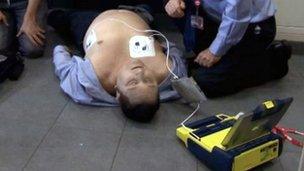Call for defibrillators in schools and leisure centres
- Published

Defibrillation can be life saving for someone who has suffered a cardiac arrest (Model demonstrating an AED)
Life-saving defibrillators should be made available at more schools and leisure centres in Scotland, according to the Scottish Liberal Democrats.
The party has obtained figures which it says shows that only a fifth of sites have the equipment.
Defibrillators deliver an electric shock to the heart in cases of cardiac arrest.
Survival chances of those affected by cardiac arrest decrease by 10% for every minute without defibrillation.
Local authorities across Scotland were asked about the provision of defibrillators at leisure centres, primary and secondary schools and other facilities where physical activity might take place.
The figures showed 19% of leisure centres - in the 17 council areas which responded - had defibrillators on site.
A total of 29 councils provided figures for schools. A fifth of secondary schools, which have facilities used by the local community such as swimming pools or gym halls, have the equipment, with the figure only 0.2% for primary schools used by the community.
'Quick treatment'
Earlier this year North Lanarkshire Council became the first local authority to announce it would be installing defibrillators in all 24 of its secondary schools.
It later said it would extend the scheme to its sports centres and swimming pools.
The Lib Dems' health spokesman Jim Hume has now called on the Scottish government to work with other local councils on similar initiatives.
He said: "Out-of-hospital cardiac arrest is the most common life-threatening emergency in Scotland.
"It is estimated to happen to at least 3,000 people each year. After someone has a cardiac arrest, every minute that passes without defibrillation reduces their chances of survival by 10%.
"Whilst our ambulance service works tirelessly to reach all cardiac arrest patients within 8 minutes we know that quick treatment can mean the difference between life and death."
He added: "A great number of schools and leisure centres open in the evenings and weekends for community activities. Whilst improving response times for our ambulance service is an imperative, it is clear communities have a significant role to play in these time-critical emergencies.
"North Lanarkshire Council has led the way on this, working in partnership with NHS Scotland and private providers to install every secondary school and most leisure centres with defibrillators.
"These figures show that we can all do much more to educate and prepare ourselves for these critical emergences, taking early steps which could save thousands of lives."
- Published24 May 2013